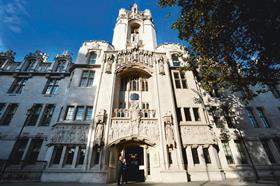In a blow to Scottish independence hopes, five Supreme Court justices ruled unanimously today that the Scottish Parliament does not have the power to legislate for a second referendum.
The judgment handed down this morning is the latest step in the Scottish government's bid to repeat the 2014 referendum in which 55% of voters opposed independence.

The impact of a second refrendum would have ’important political consequences’ for the UK parliament, the court heard.
In judgment, court president Lord Reed said: ’The court is not asked, and cannot be asked, to express a view on the political question of whether Scotland should become an independent country. Its task is solely to interpret the relevant provisions of the Scotland Act and decide whether the proposed Bill would relate to reserved matters.’
’The court also accepts the lord advocate’s argument that it is in the public interest that the court should decide the question referred to it. The reference has been made in order to obtain an authoritative ruling on a question of law which has already arisen as a matter of public importance.’
The court heard that the judgment was made in shorter time than was indicated might be necessary thanks to a unanimous decision from justices. The judgment was also ’prioritised over less urgent matters.’
Lord Reed said: ’A lawfully held referendum would have important political consequences in relation to the union and the United Kingdom parliament. Its outcome would possess the authority, in a constitution and political culture founded upon democracy, of a democratic expression of the view of the Scottish electorate.
’It would either strengthen or weaken the democratic legitimacy of the union and of the United Kingdom parliament’s sovereigity over Scotland, depending on which view prevailed, and would either support or undermine the democratic credentials of the independence movement.’
He added: ’The court unanimously concludes that the proposed bill does relate to reserved matters. Accordingly, in the absence of any modification of the definition of reserved matters by an order in council under section 30 of the Scotland Act, the Scottish Parliament does not have the power to legislate for a refrendum on Scottish independence.’
The Scottish National Party has argued that a second independence referendum should be held following Brexit. First Minister Nicola Sturgeon, approved by the Scottish Parliament, sought a second referendum through a section 30 order of the Scotland Act 1998, which gives Scotland its devolved powers. The order, which was used to legislate for the first referendum, was refused in 2017 by then Prime Minister Theresa May
The matter was referred to the Supreme Court by Lord Advocate Dorothy Bain KC to obtain definitive ruling if Holyrood has the power to pass independent referendum legislation without the consent of central government.
This article is now closed for comment.































18 Readers' comments